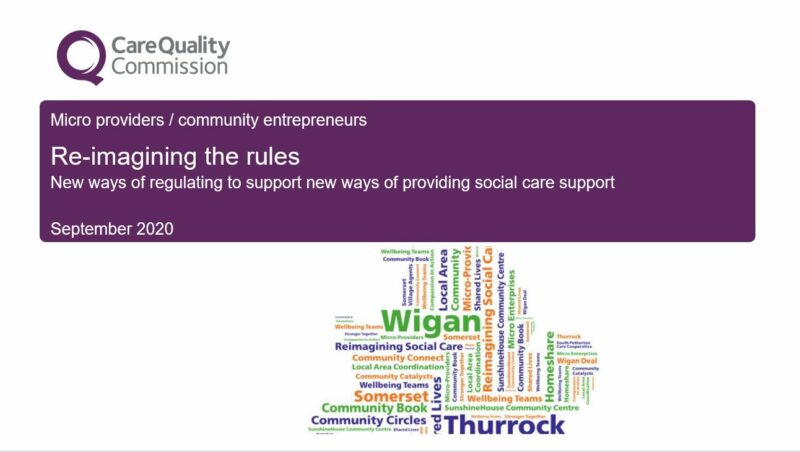This webinar, led by Simon Spoerer from CQC’s Adult Social Care Policy Team, discussed CQC’s ‘sandbox’ project, aiming to develop a flexible regulated alternative for individual care and support at home workers.
Watch the webinar
Further information and resources from the webinar
Speaker bio
Simon Spoerer RSW is Design Team Leader in the Adult Social Care Policy Team of CQC’s Strategy and Intelligence Directorate.
He qualified as a social worker in 1980 and worked in the field and as a social work manager for 9 years. He became a social care service inspector in 1989. Since then he has worked as an inspection team manager, university lecturer, and for the last ten years as a methodology developer and policy manager for CQC. Simon led work on improving the regulation of care provided to people living in their own homes. He currently leads on enforcement policy and is developing a proportionate new model for regulating micro care at home enterprises.
Very small-scale single-handed micro enterprises are providing an increasing proportion of care and support to people in their own homes. There is evidence that well-run micro enterprises can foster and promote highly responsive person-centred care, prevent institutional admissions and speed up discharges. However, there are problems:
- Not being registered can limit the scope of business activity due to the strict criteria that must be met for exemption from regulation
- Regulating micro enterprises that meet the thresholds for regulation involves disproportionate time and resources for both the commission and the provider. CQC’s methods were developed to meet the needs and circumstances of larger ‘traditional’ care at home agencies.
- Micro care businesses sometimes work closely with introductory agencies and other support organisations. This activity can take place in a legal grey area, leading to tensions and uncertainty.
- Some people using micro businesses face taking on employer responsibilities. Many do so willingly and successfully, but others struggle to do so, and don’t have access to family members or friends willing to do so for them. Taxation arrangements are complicated and sometimes hirers have ended up with large unexpected tax bills.
- Lack of regulation in this sub-sector brings additional risks for people.
CQC’s community care and support teams sandbox is developing and testing a new regulated service type for ‘umbrella bodies’ that recruit and support self-managed teams of care and support workers, informed by the ‘Shared Lives’ service model.
Simon will set out what’s been achieved and learned in the project so far, and the timelines for decisions about future policy and methods.
* This session is part of a series of webinars being run by the Reimagining Health and Care group (all welcome to join). Check out some of the previous webinars:
‘Neighbourhood Midwives: The model that boosted continuity of care by 500%’ – Annie Francis
Learn about the Buurtzorg-inspired model of care enabling self-managing teams of midwives to deliver continuity of care on their own terms.
‘We know New Public Management fails but what else can we do?‘ – Toby Lowe and Gary Wallace
Is there a better way than management by targets? Toby Lowe and Gary Wallace share the pioneering Human Learning Systems approach of Plymouth’s Health & Care system.
The first in the series was ‘Buurtzorg in the UK: learnings – and challenges – from the first 3 years’ – with Brendan Martin
